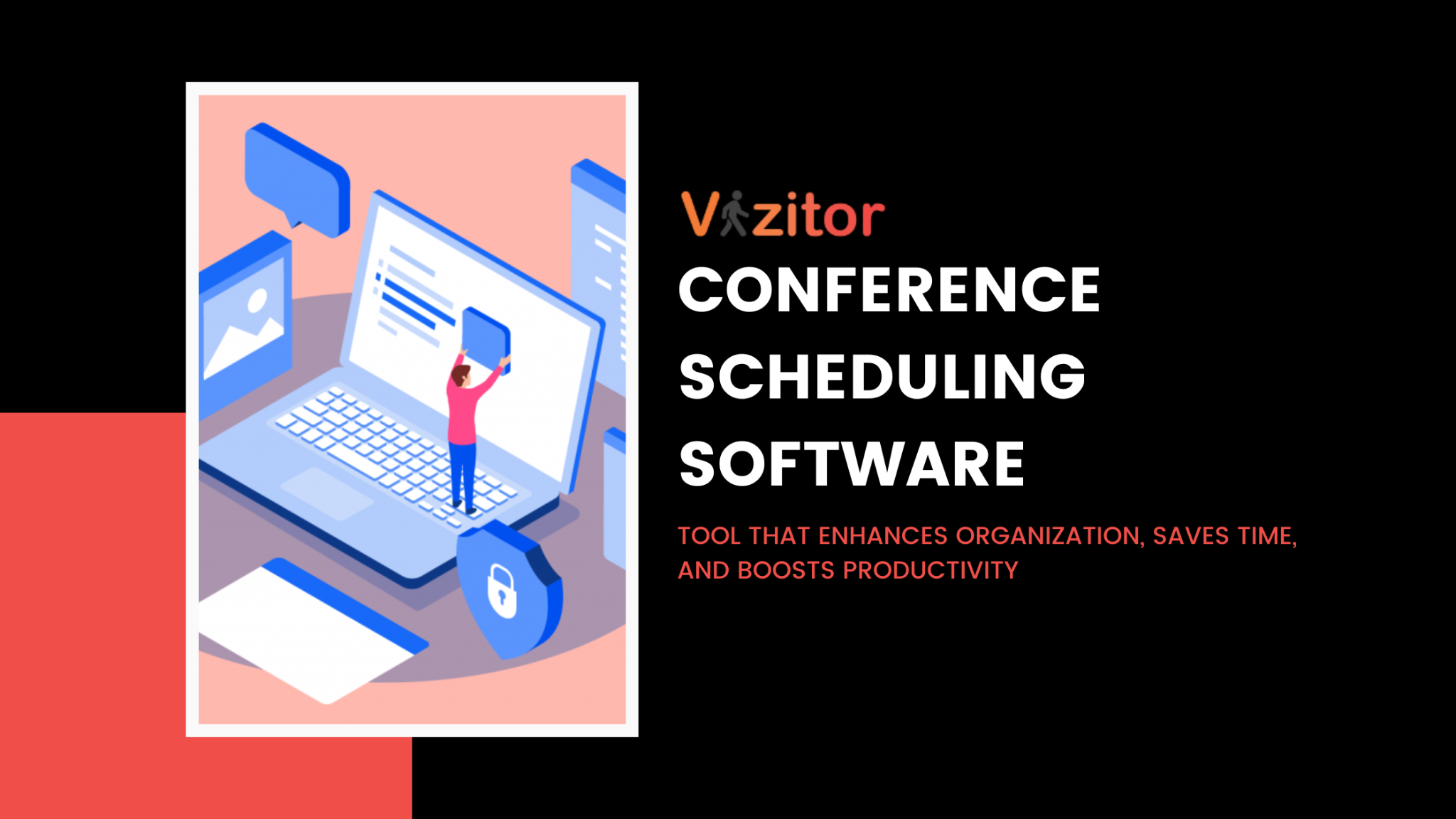Table of Content
Try Vizitor for Free!

Wed, Dec 20, 2023
Read in 14 minutes
Introduction
Did you know that 80% of professionals find managing conference schedules to be one of their biggest challenges at work? Efficiently organizing and scheduling meetings, conferences, and events can significantly impact productivity and reduce stress.
Conference scheduling software is designed to streamline this process, making it easier to book rooms, coordinate with attendees, and manage resources. With features like automated reminders, real-time updates, and integration with calendar systems, this software helps ensure that meetings run smoothly and on time.
This type of software is crucial for any organization that hosts regular events or meetings. It simplifies the booking process, minimizes scheduling conflicts, and improves overall efficiency. Automating routine tasks, frees up time for more important activities and helps avoid common pitfalls such as double bookings or missed appointments.
In essence, conference scheduling software is a valuable tool that enhances organization, saves time, and boosts productivity, making it a must-have for modern businesses.
What Is Conference Scheduling Software?
Conference scheduling software is a digital tool designed to help organizations plan, organize, and manage their meetings, conferences, and events. Its main goal is to simplify the process of booking rooms, scheduling appointments, and coordinating with participants.
Imagine you need to set up a conference for 50 people, book a room with the right equipment, and send out invitations to all the attendees. Without software, this can quickly become a complicated task involving phone calls, emails, and manual tracking. Conference scheduling software automates and streamlines these tasks, making the process more efficient and less prone to errors.
One of the key features of this software is room booking. Users can view available rooms in real time, check their capacities and available resources, and book the right space for their needs. This feature helps avoid double bookings and ensures that the chosen space meets all the requirements for the event.
Another important feature is calendar integration. The software often syncs with popular calendar apps like Google Calendar or Microsoft Outlook. This integration ensures that all participants can see the schedule and receive automatic updates about any changes, such as rescheduled meetings or cancellations.
Automated reminders are another valuable aspect. The software can send out notifications to attendees about upcoming meetings, ensuring everyone is aware of the schedule and reducing the likelihood of missed appointments.
Some advanced conference scheduling tools also include options for managing equipment and resources. For instance, if you need projectors, microphones, or catering services, the software can help coordinate these arrangements, often through integration with other systems or service providers.
Overall, conference scheduling software is essential for modern organizations. It helps save time, reduce errors, and improve communication. By automating many of the repetitive tasks involved in planning meetings and events, it allows businesses to focus on more strategic activities and enhances the overall efficiency of their operations. Whether you’re managing a large conference or a small team meeting, this software provides the tools needed to ensure everything runs smoothly and on time.
For Who Is Conference Scheduling Software Created?
Conference scheduling software is designed for a variety of users and organizations who need to manage meetings, conferences, and events efficiently. Here’s a breakdown of the primary audiences for this type of software:
Corporate Organizations:
Meeting Planners: Corporate meeting planners use the software to schedule internal meetings, team gatherings, and executive conferences, ensuring that rooms and resources are managed effectively.
Facilities Managers: Facilities managers benefit from the software by coordinating room bookings, tracking resource usage, and optimizing space utilization within the organization.
Event Organizers:
Professional Event Coordinators: Event organizers who plan large conferences, trade shows, and seminars use the software to manage complex schedules, book venues, and coordinate with vendors and attendees.
Conference Planners: Those responsible for organizing academic or industry conferences utilize the software to handle various aspects of event management, from room assignments to speaker schedules.
Educational Institutions:
Academic Administrators: Universities and colleges use scheduling software to manage classrooms, lecture halls, and meeting spaces for faculty, students, and administrative meetings.
Event Coordinators: Staff who organize campus events, workshops, and seminars benefit from the software’s ability to streamline scheduling and resource management.
Healthcare Facilities:
Hospital Administrators: In healthcare settings, administrators use the software to schedule meeting rooms, coordinate with medical staff, and manage resources for conferences and training sessions.
Medical Conference Organizers: Those who organize medical seminars, workshops, and professional development events use the software to handle scheduling and logistics.
Government Agencies:
Administrative Staff: Government departments and agencies use conference scheduling software to organize meetings, manage conference rooms, and ensure efficient use of space and resources.
Public Event Organizers: Staff responsible for public hearings, community meetings, and other events benefit from the software’s scheduling and coordination capabilities.
Non-Profit Organizations:
Event Managers: Non-profits use the software to organize fundraising events, volunteer meetings, and community outreach programs, ensuring that all logistical aspects are managed smoothly.
Administrative Teams: Administrative staff at non-profits use the software to coordinate internal meetings and manage event schedules effectively.
Small Businesses:
Office Managers: Small businesses use conference scheduling software to book meeting rooms, manage appointments, and streamline office operations.
Team Leaders: Team leaders and department heads benefit from the software’s ability to organize meetings and ensure that resources are available when needed.
Why Should Companies Invest in Conference Scheduling Software?
Investing in conference scheduling software can bring numerous benefits to companies, enhancing both efficiency and productivity. Here’s why it’s a smart investment:
1. Streamlined Scheduling Process: Conference scheduling software simplifies the process of booking rooms and managing meetings. It allows employees to view available times, book rooms, and handle other scheduling tasks quickly and efficiently. This streamlining reduces the time spent on manual scheduling and eliminates the need for back-and-forth communication, leading to smoother operations.
2. Reduced Scheduling Conflicts: With real-time visibility of room availability and automated booking processes, conference scheduling software helps prevent double bookings and other scheduling conflicts. This ensures that the right resources are available at the right time, avoiding disruptions and maintaining a well-organized meeting schedule.
3. Improved Productivity: By automating routine tasks such as sending reminders and updating calendars, the software frees up time for employees to focus on more important tasks. This boost in productivity can have a positive impact on the overall performance of the organization.
4. Enhanced Communication: Many scheduling tools integrate with popular calendar applications and communication platforms, allowing seamless updates and notifications. This integration keeps all participants informed about meeting details, changes, or cancellations, improving communication and reducing misunderstandings.
5. Efficient Resource Management: Conference scheduling software often includes features for managing additional resources like projectors, microphones, and catering services. By coordinating these resources through the software, companies can ensure that all necessary equipment and services are available and ready, enhancing the overall effectiveness of meetings.
6. Better Data and Analytics: The software can provide valuable insights and reports on meeting usage, room occupancy, and scheduling patterns. This data helps companies make informed decisions about resource allocation, identify trends, and optimize meeting spaces for better efficiency.
7. Scalability and Flexibility: As companies grow, their scheduling needs can become more complex. Conference scheduling software is designed to scale with the organization, accommodating an increasing number of meetings, rooms, and users. This flexibility ensures that the software continues to meet the company’s needs as it evolves.
8. Cost Savings: By optimizing room usage and reducing scheduling errors, companies can save money on underutilized resources and avoid costs associated with meeting disruptions. The efficiency gained from using scheduling software can lead to long-term cost savings.
Challenges Faced by Companies Without a Conference Scheduling System
Companies that don’t use a conference scheduling system often face a range of challenges that can impact their efficiency and productivity. Here’s a look at some of the key issues:
1. Double Bookings and Scheduling Conflicts: Without a centralized system, it’s easy for rooms to be double-booked or for meetings to overlap. Manual scheduling processes, such as phone calls or email confirmations, can lead to mistakes and misunderstandings, resulting in conflicts and wasted time as employees scramble to resolve these issues.
2. Inefficient Use of Resources: Without a clear view of room availability and equipment needs, companies may end up with underutilized spaces or equipment. This inefficiency can lead to wasted resources and additional costs as organizations might need to book extra rooms or rent equipment at the last minute.
3. Increased Administrative Work: Manual scheduling requires significant administrative effort. Employees may spend a considerable amount of time coordinating meetings, sending out reminders, and tracking responses. This administrative burden takes away time from more productive tasks and can lead to errors or missed appointments.
4. Poor Communication: Without automated reminders and updates, attendees might forget about meetings or be unaware of changes. This lack of communication can lead to missed appointments, delays, and a disorganized work environment, disrupting workflow and productivity.
5. Difficulty in Tracking Usage: Companies without a scheduling system may struggle to track how often rooms and resources are used. This lack of data can make it challenging to make informed decisions about resource allocation, identify underused spaces, or plan for future needs.
6. Manual Coordination of Resources: Managing additional resources such as projectors, catering, or IT support becomes more complicated without a scheduling system. Coordinating these needs manually can lead to confusion and ensure that all resources are available and prepared for the meeting.
7. Increased Risk of Errors: Manual scheduling is prone to human error. Mistakes like incorrect room bookings missed appointments, or overlooked equipment needs can disrupt meetings and impact the overall efficiency of the organization.
8. Reduced Flexibility and Scalability: As organizations grow, their scheduling needs become more complex. Without a scheduling system, adapting to these increased demands becomes challenging, leading to more manual effort and potential issues with accommodating larger or more frequent meetings.
Types of Conference Scheduling Software
Conference scheduling software comes in various types, each designed to meet different needs and preferences. Understanding the different types can help you choose the right tool for your organization’s requirements. Here are some common types of conference scheduling software:
1. Standalone Scheduling Tools: Standalone scheduling tools focus specifically on booking and managing conference rooms and meeting spaces. They often offer features like real-time availability, room reservation, and automated reminders. These tools are ideal for organizations that need a straightforward solution for scheduling without additional features.
2. Integrated Calendar Systems: Integrated calendar systems combine conference scheduling with broader calendar management. These tools sync with popular calendar applications like Google Calendar or Microsoft Outlook. They provide seamless scheduling and booking capabilities while integrating with existing calendar systems. This integration ensures that all participants are automatically updated about meeting changes and avoids conflicts with other calendar events.
3. All-in-One Event Management Platforms: All-in-one event management platforms offer comprehensive solutions that go beyond simple scheduling. They include features for managing invitations, tracking RSVPs, coordinating catering and equipment, and even handling on-site check-ins. These platforms are ideal for large conferences or events where multiple aspects of event management need to be coordinated.
4. Collaborative Scheduling Tools: Collaborative scheduling tools focus on enhancing teamwork and communication. They allow multiple users to access and manage the scheduling system, making it easier to coordinate meetings with different team members. Features often include shared calendars, group booking options, and real-time updates, facilitating better collaboration and reducing scheduling conflicts.
5. Specialized Conference Software: Specialized conference software is tailored for specific types of events, such as academic conferences, trade shows, or corporate seminars. These tools often come with features designed to handle the unique needs of these events, such as session tracking, speaker management, and attendee networking.
6. Mobile-Friendly Scheduling Apps: Mobile-friendly scheduling apps are designed to be used on smartphones and tablets. They offer the flexibility to manage and book meetings on the go, making them ideal for busy professionals who need to access scheduling tools while away from their desks.
How Will Vizitor Help With Conference Scheduling Software?
Vizitor’s conference scheduling software streamlines the process of organizing and managing meetings with ease. By offering real-time room availability, automated reminders, and seamless integration with popular calendar systems.
Vizitor helps ensure that your meetings run smoothly and efficiently. With its user-friendly interface and powerful features, Vizitor is designed to enhance productivity and reduce scheduling conflicts.
Streamlined Scheduling: Intuitive interface for easy room viewing and booking. Real-time availability checks to prevent double bookings and conflicts.
Seamless Integration: Syncs with popular calendar applications like Google Calendar and Microsoft Outlook. Ensures automatic updates and reduces scheduling conflicts.
Automated Reminders and Notifications: Sends timely reminders to attendees about upcoming meetings and schedule changes. Reduces missed appointments and keeps communication clear.
Effective Resource Management: Coordinates additional resources like projectors, catering, and equipment. Ensures all necessary resources are available and ready for each meeting.
Valuable Insights and Reporting: Tracks room usage, resource allocation, and scheduling patterns. Provides detailed reports for informed decision-making and optimization.
Flexibility and Scalability: Adapts to growing and complex scheduling needs. User-friendly interface suitable for businesses of all sizes.
Detailed Benefits Section
Streamlined Scheduling Process
Scheduling software enables employees to view real-time room availability, book rooms instantly, and reduce time-consuming manual coordination. This leads to faster, smoother operations.
Reduced Scheduling Conflicts
Automated booking features prevent double bookings and resource conflicts. Real-time availability ensures that only open slots are displayed, reducing disruptions and maintaining an organized schedule.
Improved Productivity
With reminders, real-time updates, and calendar integrations, employees can focus on more important tasks, enhancing overall productivity and freeing up time for critical responsibilities.
Enhanced Communication
By integrating with email and calendar systems, scheduling software keeps attendees informed with automatic updates about schedule changes or cancellations, reducing miscommunications.
Efficient Resource Management
The software supports managing resources like projectors, microphones, and catering by ensuring that all required resources are booked in advance, creating smoother, well-equipped meetings.
Data and Analytics
Get insights on room occupancy rates, meeting durations, and booking trends. These analytics allow companies to make data-backed decisions, optimizing resources and meeting schedules.
Frequently Asked Questions
What is conference scheduling software?
Conference scheduling software is a tool designed to manage and organize meetings, conferences, and events. It helps users book rooms, coordinate resources, send reminders, and handle scheduling conflicts efficiently.
How does conference scheduling software improve efficiency?
It automates the booking process, reduces manual errors, integrates with calendar systems, and sends automatic reminders, all of which help streamline scheduling and save time.
Can conference scheduling software integrate with other systems?
Yes, many conference scheduling tools integrate with popular calendar applications (e.g., Google Calendar, Microsoft Outlook), email systems, and sometimes other business management tools to provide a seamless scheduling experience.
What features should I look for in conference scheduling software?
Key features to consider include real-time room availability, automated booking and reminders, resource management (e.g., equipment and catering), calendar integration, reporting and analytics, and user access control.
Is conference scheduling software suitable for small businesses?
Yes, conference scheduling software can be beneficial for businesses of all sizes. Many solutions offer scalable options that cater to both small and large organizations, helping to improve scheduling efficiency regardless of company size.
How does automated scheduling work?
Automated scheduling software checks room availability and scheduling conflicts in real-time. It handles booking requests, sends automatic confirmations and reminders, and updates calendars to reflect any changes.
Can users manage resources like projectors or catering through the software?
Yes, many conference scheduling tools allow users to coordinate additional resources such as projectors, microphones, and catering services, often through integration with other systems or service providers.
What are the benefits of using automated reminders and notifications?
Automated reminders help ensure that attendees are aware of upcoming meetings and any changes to the schedule, reducing the risk of missed appointments and improving overall attendance.
How does conference scheduling software handle scheduling conflicts?
The software detects conflicts by comparing booking requests with existing reservations in real-time. It prevents double bookings by displaying up-to-date availability and offering alternative times if conflicts arise.
Can I access conference scheduling software on mobile devices?
Many conference scheduling tools offer mobile-friendly versions or apps that allow users to manage bookings and schedules on smartphones and tablets, providing flexibility and convenience.
How does reporting and analytics help with scheduling?
Reporting and analytics features provide insights into room usage, resource allocation, and scheduling patterns. This data helps organizations make informed decisions about resource management and optimize scheduling practices.
Is training required to use conference scheduling software?
While many software solutions are user-friendly, some may require a brief training period to familiarize users with the features and functions. Most providers offer support and training resources to help users get started.
What kind of support is available for conference scheduling software?
Support options typically include online resources (such as tutorials and FAQs), customer service via phone or email, and live chat. Some providers also offer dedicated account managers or support teams to assist with more complex issues.
What should I consider when choosing conference scheduling software?
Look for features like room booking, calendar sync, resource management, automated reminders, and reporting capabilities. Make sure it aligns with your organization’s specific needs.
Is there a way to integrate conference scheduling software with CRM or project management tools?
Yes, some advanced scheduling tools allow integration with CRM and project management software, providing a unified solution for meetings and project tracking.
Can I restrict access to certain rooms?
Many scheduling tools offer access controls, letting you manage permissions for specific rooms or resources to designated employees or departments.
Latest Blog

Top 12 Queue Management Tools & Solutions for 2025
Wed, Apr 2, 2025
Explore the Top 12 Queue Management Tools and Solutions for 2025 in our comprehensive guide. Perfect for businesses of all sizes, this guide covers unique features, pricing, and the best choices for different business needs, from digital check-ins to advanced service analytics. Find the perfect queue management system to enhance customer experience and improve operational efficiency.
Know more







